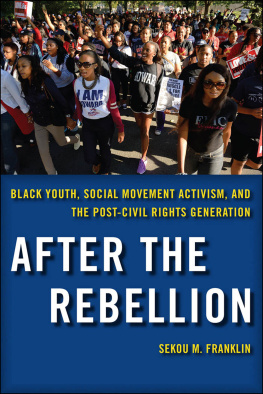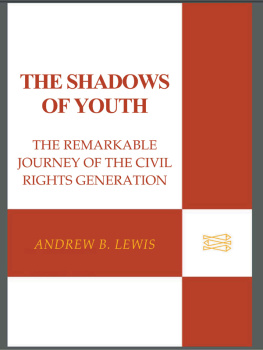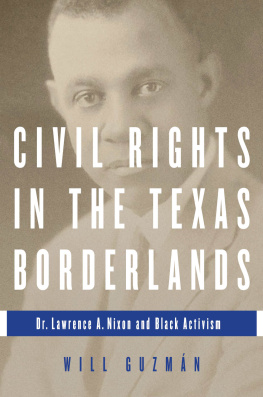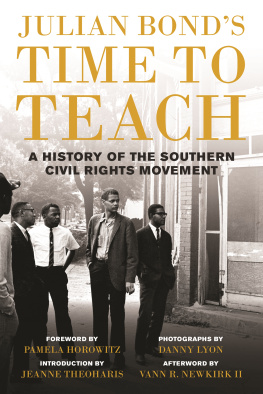Thank you for buying this ebook, published by NYU Press.
Sign up for our e-newsletters to receive information about forthcoming books, special discounts, and more!
Sign Up!
About NYU Press
A publisher of original scholarship since its founding in 1916, New York University Press Produces more than 100 new books each year, with a backlist of 3,000 titles in print. Working across the humanities and social sciences, NYU Press has award-winning lists in sociology, law, cultural and American studies, religion, American history, anthropology, politics, criminology, media and communication, literary studies, and psychology.
AFTER THE REBELLION
NEW YORK UNIVERSITY PRESS
New York and London
www.nyupress.org
2014 by New York University
All rights reserved
References to Internet websites (URLs) were accurate at the time of writing. Neither the author nor New York University Press is responsible for URLs that may have expired or changed since the manuscript was prepared.
Library of Congress Cataloging-in-Publication Data
Franklin, Sekou M.
After the rebellion : black youth, social movement activism, and the
post-civil rights generation/Sekou M. Franklin.
pages cm Includes bibliographical references and index.
ISBN 978-0-8147-8938-4 (hbk.) ISBN 978-0-8147-6481-7 (pbk.)
1. African AmericansSocial conditons20th century.
2. Civil rights movementUnited StatesHistory20th century.
3. Youth, BlackUnited StatesHistory20th century. I. Title.
E185.615.F723 2014
305.23509730904dc23 2014004206
New York University Press books are printed on acid-free paper, and their binding materials are chosen for strength and durability. We strive to use environmentally responsible suppliers and materials to the greatest extent possible in publishing our books.
Manufactured in the United States of America
10 9 8 7 6 5 4 3 2 1
Also available as an ebook
ACKNOWLEDGMENTS
The completion of this book would not have been possible without the help of family, friends, colleagues, and mentors. This research project began while I was at Howard University. Robert Brown, Martell Teasley, and Robert Vinson from Howard deserve special mention for guiding me throughout the writing process. Michael Frazier gave further assistance and Lorenzo Morris provided insightful comments on earlier drafts of this work. Clarence Lusane and Elizabeth Clark-Lewis, two notable scholars, also helped with my transition through Howard University.
A large part of my scholarly development is due to Robert C. Smith. He has been a mentor and friend, who first taught me African American politics as a graduate student at San Francisco State University. Professor Smith (and his wife Scottie) handed me to Howard University, where Richard Seltzer gave me additional mentorship during my doctoral years. Donn Davis is another advisor and comrade who still serves as my social movement advisor years after I departed Howard University. Joseph P. McCormick has been a valuable resource and mentor who always demands the best of his students, while celebrating their innovation and career benchmarks. For this, I am eternally grateful to him and his wife, Janet.
Portions of this book were read by numerous scholars at conferences hosted by the National Conference of Black Political Scientists, the Southwest Labor Studies Association, the Southern Political Science Association, and the Popular Culture Association. I am also grateful to the anonymous reviewers for the book as well as numerous colleagues and friends, many of whom read or reviewed parts of this book. Over the years, I learned a great deal from Melanie Njeri Jackson, Hanes Walton, Frank Pryor, Alex Willingham, Wendy Smooth, Diane Pinderhughes, Sundiata Cha-Jua, Cedric Johnson, Artemesia Stanberry, Baruti Jahi, Janet Flammang, Jesus Martnez-Saldaa, Dennis Gordon, Dorian Warren, Byron DAndra Orey, Boris Ricks, Adonijah Bakari, Andra Gillespie, Tyson King-Meadows, Dionne Knox, John Williams, Pearl Ford Dowe, Angela Lewis, Evelyn Simien, Joy Banks, Nell Levin, Calvin Hill, Stephen Morris, John Davis, David Montague, Todd Shaw, Lynn Hampton, Adolphus Belk, Mont and Marilyn Brown, Jermaine Hardy, Jackie Sims, Louis Woods, Peter Brannon, Lorna Gonsalves, Gwen Sumlin, Alvin Thornton, John Vile, Jacques Bolivar, Sylvanna Falcon, Evonne Tisdale, Melina Abdulla, Denise Carlson, Keith Caldwell, Pam Davis, Rose Harris, Melanye and Melynda Price, Christie Williams, Thomas Bynum, Ida Jones, Kenneth Caine, Rev. James Lawsons Nonviolent Resistance Group, and Rev. Henry Blazes Ad Hoc Committee for Equity. I also thank my editors at NYU Press, Ilene Kalish and Caelyn Cobb.
I owe special thanks to Lisa Y. Sullivan, Kia Chatmon, Claudine Candy Taffe, Nicole Johnson, Steven White, Helene Fisher, and Felicia Verdin. These individuals gave me access to their personal archives detailing the activities of the Black Student Leadership Network and connected me to former members of the organization. Lynda DeLoach also made a special effort to help me navigate the archives of the AFL-CIOs Union Summer Program at the George Meany Memorial Archives.
In addition, I thank the University of Illinoiss Afro-American Studies Program as well as the Faculty Research and Creative Projects Committee and Department of Political Science at Middle Tennessee State University for financially supporting this book project. The Office of Institutional Equity at Middle Tennessee State University, led by Forrestine White Williams and Barbara Patton, also provided financial assistance toward the completion of the project. And, I was fortunate to receive a grant from the W. T. Grant Foundation to research juvenile justice activism in Louisiana, Maryland, and New York in 2004 and 2005.
My family has been especially supportive throughout this book project. This includes my aunts and uncles (Boose, Clyde, Harold, Helen, Curtis, Ron, Evelyn, Jonell, Pete, John, Neil, Shirley, and Grant); my brothers (Malik and Tyrone); my father, mother, stepfather, and grandmother (Thomas Franklin, Georgia Pierson, Rev. Robert Pierson, grandmother Penny); and my in-laws (Rudy, Dollie, and Rasheed). Finally, this book is dedicated to my lifelong partner, Ten, and our two daughters (Sojourner and Langston) for traveling with me during this long journey.










